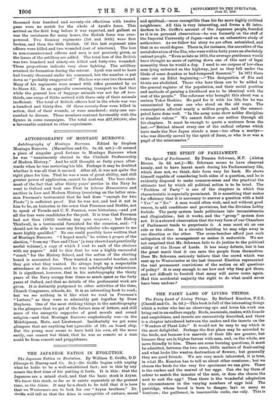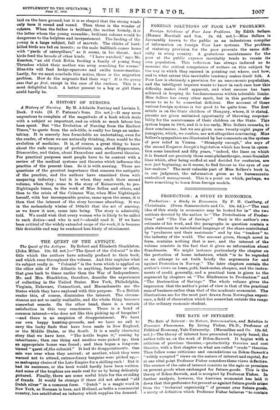THE FAIRY LAND OF LIVING THINGS.
The Fairy Land of Living Things. By Richard Kearton, F.Z.S. (Cassell and Co. 3s. 6d.)—This book is full of the interesting things which a writer who has an observing eye and loves his work can bring out in an endless supply. Birds, mammals, snakes, with lizards and amphibians, and insects are successively described, and there is a chapter introduced between the snakes and the insects on the "Wonders of Plant Life." It would not be easy to say which is the most delightful. Perhaps the first place may be accorded to the birds, not because the marvels of their life are greater, but because they are in higher favour with man, and, on the whole, are more friendly to him. There are some burning questions, it must be admitted, between the two races, little matters of fruit-eating aud what looks like wanton destruction of flowers ; but generally they are good friends. We are very much interested, it is true, in what Mr. Kearton has to tell us about other creatures; but we choose the birds for the very few specimens we can give. There is the cuckoo and the marvel of her eggs. Can she lay them of colour to match the inmates of the nest, or does she choose the nest to suit the egg? Then there is the 'wonderful adaptation to circumstances in the varying numbers of eggs laid. The partridge, whose brood is born to danger, lays as many as fourteen ; the guillemot, in inaccessible rocks, one only. This is laid on the bare ground, but it is so shaped that the strong winds only turn it round and round. Then there is the wonder of Mows. When the father is brilliant, the mother homely, it is the latter whom the young resemble ; brilliant colours would be dangerous to the helpless and inexperienced. The feeding of the young is a large subject, full of marvels. The chicks of hard- killed birds are fed on insects ; so the male bullfinch comes home with "yards of caterpillars," as it seems, in his throat. And birds feed the broods of other kinds. "I have watched," says Mr. Hearten, "an old Cock Robin feeding a family of young Song .Thrushes whilst their mother was away searching for worms." Blue-tits will feed hedge-sparrows and swifts house-martins. Lastly, for we must conclude this notice, there is the migration problem. How do the migrants find their way ? It is the young ones that go first, except in the case of the cuckoos. This is a most delightful book. A better present to a boy or girl there could hardly be.























































 Previous page
Previous page